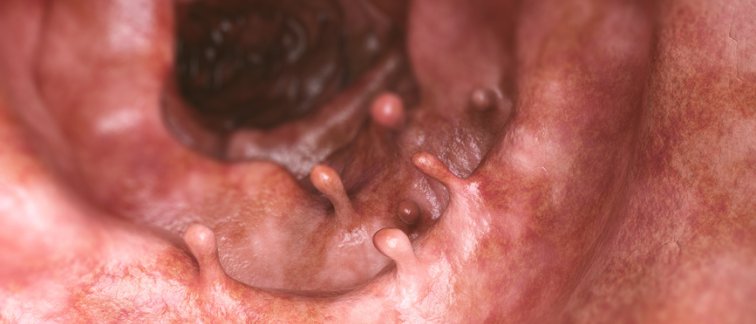Familial adenomatous polyposis (FAP)
Within a large European consortium of FAP centers, established in 2019, we perform clinical studies with the goal to optimize endoscopic surveillance for patients with FAP. Currently, no personalized surveillance protocols are available for the lower GI tract. For the upper GI tract, the current Spigelman classification system showed multiple limitations.
We developed personalized surveillance and intervention protocols for lower and upper GI tract and evaluate the efficacy in a prospective registry. The main goal of this new strategy is to prevent development of cancer and surgery and thereby improving the quality of life of our patients. In a randomized controlled trial, we investigate what the preferred endoscopic imaging technique is for surveillance endoscopies of pouches in patients who underwent proctocolectomy and ileal pouch-anal anastomosis. We compare two different techniques, dye chromoendoscopy and virtual chromoendoscopy (i.e. narrow band imaging), and compare these techniques in terms of polyp detection.
In the last decade, an increase in the number of gastric cancer diagnoses in FAP has been observed. We aim to perform future studies on the pathogenesis of gastric cancer in FAP and aim to optimize endoscopic surveillance of the stomach to prevent gastric cancer in the future.
Patients with FAP often have psychosocial issues which might be caused by undergoing surgery and frequent endoscopies at a young age or by the disease itself. We currently evaluate which issues are most often present in patients with FAP which will help us to provide adequate psychosocial support for our patients in the future.
Serrated polyposis syndrome (SPS)
Serrated Polyposis Syndrome (SPS) is a condition characterized by the presence of multiple serrated polyps throughout the colon. Over the past decade, it has become widely recognized that serrated polyps are responsible for up to 30% of colorectal cancer (CRC). As a result, patients with SPS require careful endoscopic surveillance, including the removal of these polyps, to reduce their cancer risk. However, the optimal interval between colonoscopies that balances safety and effectiveness remains uncertain.
To address this, we are currently conducting a large prospective multicenter study to evaluate the safety and effectiveness of a personalized surveillance protocol for SPS patients. Our goal is to determine the optimal surveillance interval that minimizes the burden of unnecessary colonoscopies while ensuring a low risk of CRC.
Microbiome in FAP and SPS
In addition to our clinical research, we plan to conduct future studies exploring the role of the immune system and gut microbiome in the initiation and progression of FAP and SPS Through both translational and basic research, our goal is to understand the mechanisms by which environmental factors and the tumor microenvironment influence disease progression in these polyposis syndromes.

